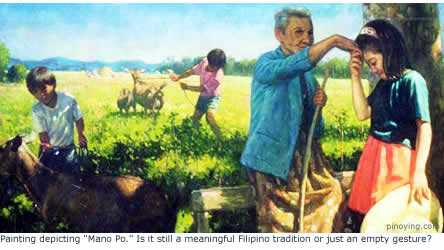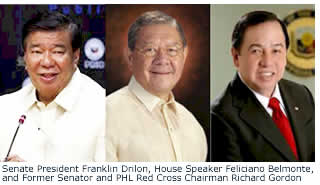 n a country where the
elderly have always been given due deference and respect, in today's
politics you have the exact opposite. Instead of the senior most
experienced leaders running for office, you have ambitious, precocious,
youth, still wet behind the ears who do the running. The result of this
phenomena is that over the years the Philippines has continually lost
ground to its neighbors who are all slowly turning into developed
economies while the Philippines—the country that lead Southeast Asia
during much of the 20th Century—is becoming more deeply entrenched as a
Third World nation. n a country where the
elderly have always been given due deference and respect, in today's
politics you have the exact opposite. Instead of the senior most
experienced leaders running for office, you have ambitious, precocious,
youth, still wet behind the ears who do the running. The result of this
phenomena is that over the years the Philippines has continually lost
ground to its neighbors who are all slowly turning into developed
economies while the Philippines—the country that lead Southeast Asia
during much of the 20th Century—is becoming more deeply entrenched as a
Third World nation.

The word that encapsulates
this trend is "TRAPO" a contraction of phrase "traditional politician."
It has become the broad brush by which Filipinos paint all their "elder"
statesmen as corrupt politicians who remain in power solely to continue
stealing from the people. While there are indeed many who fit that
description (his detractors point to Jejomar Binay as the poster-child
for true dyed-in-the-wool TRAPOs), there are just as well many good,
seasoned statesmen who are tarnished by it.
In Singapore for
example, Prime Minister Lee Kuan Yew was in his late 60s when Singapore
made its greatest strides. Then as Senior Minister in his 70s, he had
decades of experience under his belt and used it to catapult Singapore
to even greater heights.
Looking back at our own
history, in 1965 the Philippines chose a brash, young, and daring
Ferdinand Marcos over the elder more staid Sergio Osmena Jr. We wonder
how different the Philippines might be today had Pinoys chosen Osmena
over Marcos that year?
Continuing on the realm
of "what ifs;" what if Marcos had become president when he was in his
50's or 60s instead of his late 40s. Would an older Imelda still have
had a roomful of shoes—or feel the need to close down Saks Fifth Avenue
in New York for a private day of shopping? It is likely those would have
been seen as unnecessary to an older, more mature couple—as would the
unmitigated lust for power and money that characterized the Marcos era.
On the surface,
Filipinos appear to respect the elderly. They take pride in this fact
and see Filipino society as better than those that are not as overtly
deferential to older people. But today's Filipinos are living a lie. If
respect for elders was true back then, it no longer is true today. And
the clearest proof of this is in the electoral field where elder
statesmen are now all cynically regarded as TRAPOs.
Senate President
Franklin Drilon, House Speaker Feliciano Belmonte, Former Senator and
Philippine Red Cross Chairman Richard Gordon, to name a few are
"traditional politicians" with a wealth of experience who should be
running for president but aren't because Filipinos have "thrown the baby
out with the bath water"—so to speak. These politicos have been around too long and
therefore they must be corrupt; so the twisted reasoning goes.

Instead Pinoys prefer a
new flavor-of-the-month celebrity, with good looks and an engaging smile
who, for a while at least, can make them forget all the squalor and misery
that surrounds them. These new darlings may be totally inept and
unqualified for the offices they seek, but they'll do because that's the
way we Filipinos choose our politicians. We use our hearts and not our
heads.
The "Mano Po"
tradition is now a meaningless, empty gesture to fool foreigners—and
ourselves—into believing we still are who we no longer are. Sadly,
unless the Philippines finds a way of righting itself, and gives those
with the most wisdom and experience the opportunity to lead, it may
never catch up, and remain a Third World country forever.
Published 9/24/2015 |